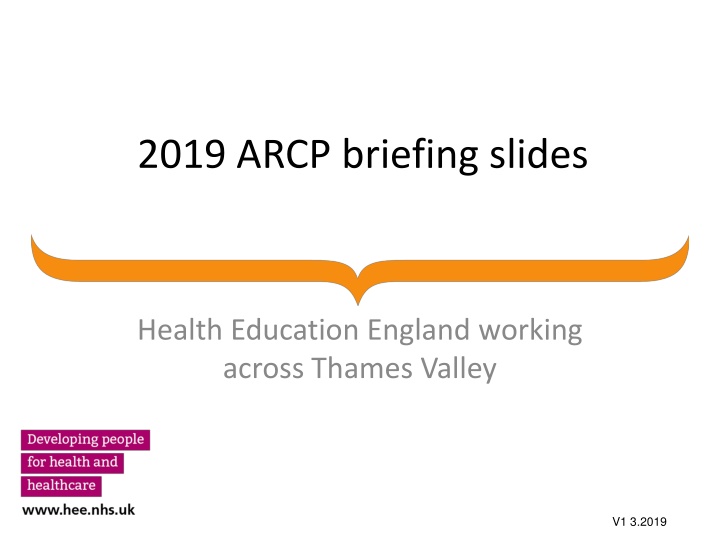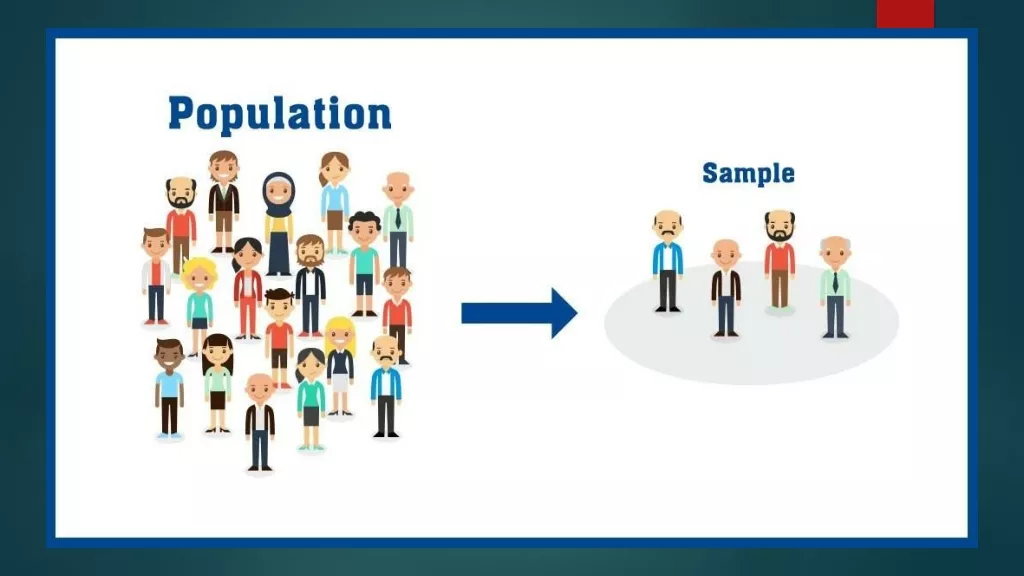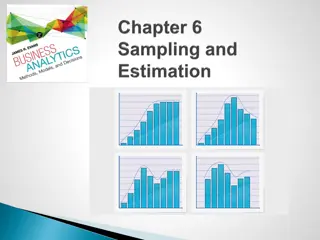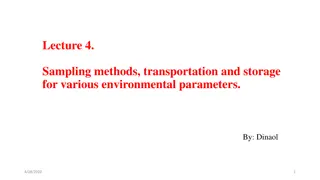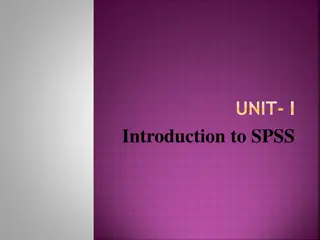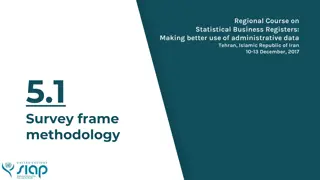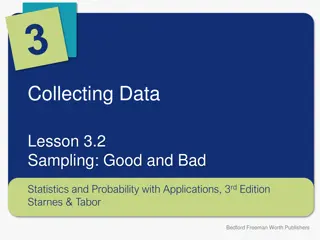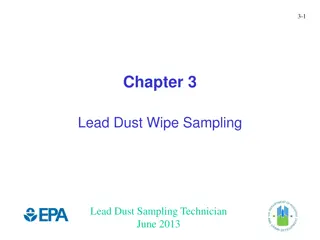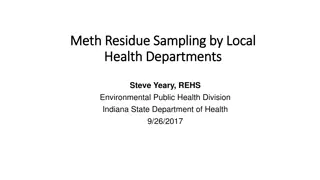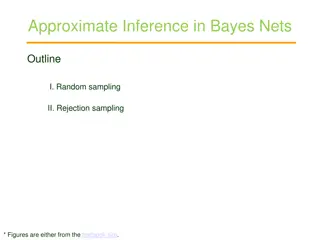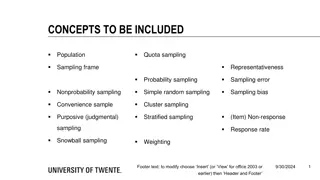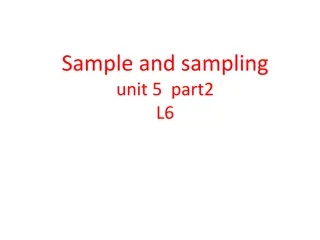Essential Sampling Methods in Statistical Analysis
Sampling is a crucial process in statistical analysis where a representative group is selected from a larger population to draw accurate conclusions. Understanding the difference between population and sample, defining target population, choosing a sampling frame, and determining sample size are key steps in conducting meaningful research studies. Careful selection of a sample ensures the validity of results and minimizes biases such as sampling bias.
Download Presentation

Please find below an Image/Link to download the presentation.
The content on the website is provided AS IS for your information and personal use only. It may not be sold, licensed, or shared on other websites without obtaining consent from the author.If you encounter any issues during the download, it is possible that the publisher has removed the file from their server.
You are allowed to download the files provided on this website for personal or commercial use, subject to the condition that they are used lawfully. All files are the property of their respective owners.
The content on the website is provided AS IS for your information and personal use only. It may not be sold, licensed, or shared on other websites without obtaining consent from the author.
E N D
Presentation Transcript
2019 ARCP briefing slides Health Education England working across Thames Valley V1 3.2019
Welcome Thank you For preparing for today by scrutinising the e-portfolios For attending today to support the process For giving feedback to trainees on their Outcomes V1 3.2019
Whos who and roles today Chair of the panel Kim Emerson Programme Manager and/or Recruitment & Assessment Administrator Lucianna Zandonadi Lay Representative N/A Panel members Perihan Colyer Suzie Gill Ann Sanders Richard Silvester Kate Staveley External Representative Tara George (RCGP/EA) Academic Representative (if applicable)- None Visitors None Please nominate a panel member to complete the revalidation check list (completed by Admin/Panel Chair in GP, Panel Chair for Foundation)
Purpose and scope of ARCP panel review To review the material in the trainee s portfolio and issue an outcome having mapped the evidence submitted to that required for demonstrating progress in the specialty curriculum ONLY material submitted in the portfolio can be considered by the ARCP panel The trainee s ES must notbe involved in panel discussions if they are present at the review V1 3.2019
Fitness to Practise Fitness to Practise is separately considered as part of the process to support the Dean s recommendation for revalidation There needs to be follow-up (by TPD and / or ES) to ensure actions recommended by the ARCP panel actually happen V1 3.2019
Tasks for the panel Participating in the discussion about a trainee s evidence of progression and fitness to practise Completing form /checklist to support revalidation Completing a feedback sheet for the ES on their report Piloting / driving the ePortfolio Completing a draft ARCP outcome form once a decision is made Lay, External and Dean s reps will all produce a report on the event V1 3.2019
Outcomes 1-6 for all trainees holding a number and in programme The 7 prefix is used only for trainees without an NTN (eg LATs) The 8 prefix is for trainees currently out of programme There are reference sheets describing outcomes on the table V1 3.2019
Trainees with two ARCP outcome forms Those dual accrediting (mainly in medical specialties) Those whose Form R arrived after the predetermined deadline (TWO WEEKS before the ARCP), but before the ARCP panel review must be issued a 5 then the training outcome- overruled for GP and as long as in place at date of panel no outcome 5 Those who have spent part of the year in research and part in clinical training need one for each phase, ditto maternity leave / long term sick leave V1 3.2019
N and U codes All trainees must have an annual update on training progression (Foundation, Core and Specialty, Full and Less than Full Time) If there is no, or insufficient (e.g. less than 3 months whole time equivalent) training to review, then a U or N code should be uploaded N = no outcome U = unsatisfactory outcome Both have drop down menus on electronic forms to expand narrative V1 3.2019
Interim and / or mop-up ARCPs These are formal reviews May be called after an unsatisfactory outcome to monitor progress since remedy was prescribed May be to review the evidence leading to an Outcome 5 being issued to determine revised Outcome An Outcome should be issued Some specialties review trainees six months after programme commences at an 'interim review' which is NOT an ARCP even if on the same day as ARCPs V1 3.2019
Less than full time trainees Should be reviewed annually Accrual of work place based assessments and other curriculum requirements is assessed pro rata 50% WTE = 50% of evidence V1 3.2019
Ready-reckoner for LTFT training V1 3.2019
Revalidation Basics Revalidation dates are set by the GMC and are not automatically linked to ARCP or CCT dates. Trainees should be revalidated every 5 years and additionally at CCT (subject to sufficient evidence/no ongoing concerns). Trainees must maintain their connection to the correct Designated Body throughout their training period. OOP does not change this. ARCP is not instead of revalidation but provides the main source of evidence to support it. Trainees who have held non-training posts before or between training programmes are expected to have had and provide an appraisal for this work (send to revalidation.tv@hee.nhs.uk). V1 3.2019
ARCP Revalidation: Evidence Checklist (1) The Panel must review all the evidence relating to revalidation and fitness to practise: Form R (Part A and B) Whole scope of practice form for work that is not part of training (has it been signed off at the place work carried out and by the ES?) ES Report (or equivalent for OOP/Academic trainees) including statement regarding any SIRIs or other concerns Exception reports from employers (if applicable) Serious or immediate fitness to practise concerns identified? Ensure that the RO is notified (Revalidation.tv@hee.nhs.uk) V1 3.2019
ARCP Revalidation: Evidence Checklist (2) For any SIRIs, incidents, complaints or other issues: Has the trainee appropriately declared and reflected on the relevant concerns? Has the trainee updated on any previously declared concerns are these now resolved? Are any of the concerns ongoing (e.g. SIRI investigation not yet undertaken, disciplinary hearing pending)? Does the panel believe that these impact on the trainee s fitness to practise? Serious or immediate fitness to practise concerns identified? Ensure that the RO is notified (Revalidation.tv@hee.nhs.uk) V1 3.2019
ARCP Revalidation: Evidence Checklist (3) Remember the trainee is expected to declare all levels of concerns, employers generally report the higher level ones only. The ES and trainee should be aware of anything the employer has reported. Please complete the ARCP Revalidation Checklist for each trainee and the revalidation section on the ARCP Outcome Form. Serious or immediate fitness to practise concerns identified? Ensure that the RO is notified (Revalidation.tv@hee.nhs.uk) V1 3.2019
Revalidation and ARCP outcome Late Form R = Outcome 5- if not present at date of panel Outcome 1 or 6 cannot be given until Form R provided If awarding Outcome 5, indicate on the Revalidation ARCP Checklist what the likely outcome will be Update CCT date (even if estimate) - this helps the Revalidation Team ensure a trainee has a recommendation made at the correct point in training Form R required for each ARCP (unless on same day) Virtual Panels for Outcome 6 please ensure Revalidation Team are made aware and that a Form R has been completed (or at the very least the trainee must confirm nothing additional to declare) V1 3.2019
Local Arrangements ARCP panel Chair Please feel free to add any specialty specific issues here Lack of GMC survey completion should be noted in ARCP form, ideally a reflective log should be written but no outcome 5 will be awarded As long as ESRs completed by date of panel no outcome 5 Feedback for ESs from list of quotes or other info, emailed unless adverse in which AD emailed to feedback and support Conflicts interest PD for trainee no special involvement fine, if trainee worked in practice, personally known or ES to them must not be part of panel V1 3.2019
Outcomes Outcome 1: Satisfactory progress Achieving progress and the development of competences at the expected rate. Outcome 2: Development of specific competences required additional training time not required. Outcome 3: Inadequate progress additional training time required. Outcome 4: Released from training programme with or without specified competences. Outcome 5: Incomplete evidence presented additional training time maybe required. Outcome 6: Has met all the required clinical competences to complete the training programme and will be recommended for award of a CCT . Outcome 8: Out of programme.
Reasons for outcome 5s Missing assessments COTS/Mini-cex/CbDs/ CSR/MSF/PSQ Exam results pending Missing evidence AED/CPR/safe guarding Missing OOHs at final ARCP, no longer at ST1/2
CPD You can claim up to two CPD points per year through attendance / involvement with an ARCP panel Please ask the Chair or EPM (Education Progamme Manager) for a certificate V1 3.2019
Thank you Any comments / queries / suggestions, please contact Rebecca Black, Associate Dean Rebecca.black@hee.nhs.uk V1 3.2019
